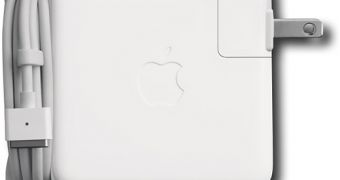Earlier this week, the company developing Mac OS X filed a patent infringement lawsuit against Media Solutions Holdings, a firm that allegedly copied the design of one of Apple’s products, and is now selling MacBook Power Adapters based on that design. Apple’s Power Adapter for MacBooks, also known as the MagSafe Adapter, sports a magnetic plug that prevents the notebook from falling off a surface, in the case of accidental tripping over the adapter’s cable.
In the suit, the company headquartered in Cupertino, California claims that Media Solutions Holdings sells "various consumer electronic accessories at retail, including knock-off power adapters for use with genuine Apple portable computers,” through www.laptopsforless.com, www.laptopacadapter.com and www.ereplacements.com. Amazon.com lists the 3rd party power adapter as available. The accessory sold by Media Solutions Holdings costs $43, whereas Apple’s original adapter, designed in Cupertino-California (and assembled elsewhere), costs $73. An unknowing MacBook user is sure to fall in this trap and buy the cheaper adapter, perhaps damaging their laptop.
The suit is actually based on Apple’s claims that the adapters sold by Media Solutions Holdings violate one of its own patents, particularly one for “Power Adapter,” which the Mac maker issued in 2003. The patent not only details how the advanced power source works, but also the design of said accessory, a design the “knock-off” firm has emulated, according to Apple’s legal. "Through various Web sites and otherwise, the Defendants market these knock-off power adapters for use with Apple portable computers, such as the MacBook," the complaint states.
As Apple seeks to put an end to 'knock off' MacBook power supplies, the company continues to fight in another court with the now famous Psystar, a company that sells generic PCs hacked for running Mac OS X Leopard. Apple recently won a session of hearing in court against Psystar, who was found guilty of violating Apple’s rights to reproduce OS X, distribute it, and to create derivative works. Apple sued Psystar in July 2008, accusing the “Mac cloner” of copyright infringement, breach of contract, trademark and trade infringement, and unfair competition.

 14 DAY TRIAL //
14 DAY TRIAL //